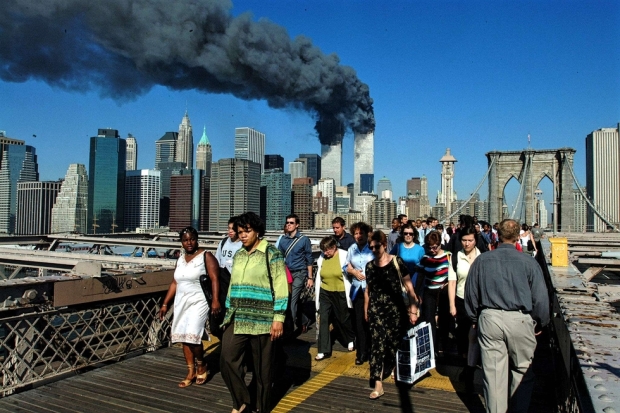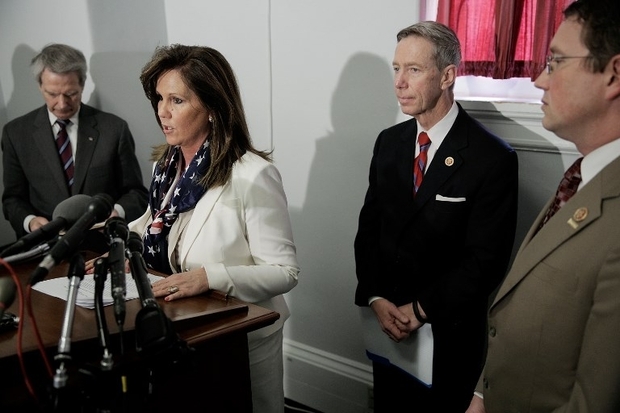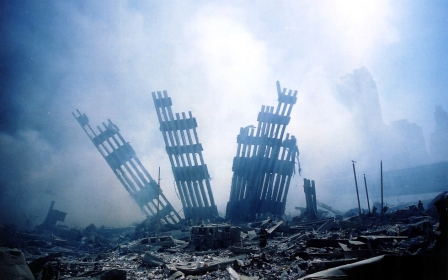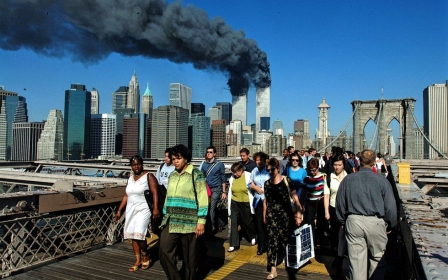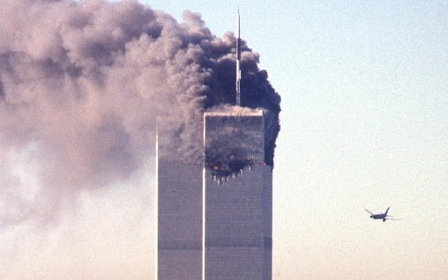Bin Salman flies into New York as 9/11 families push case against Saudi Arabia
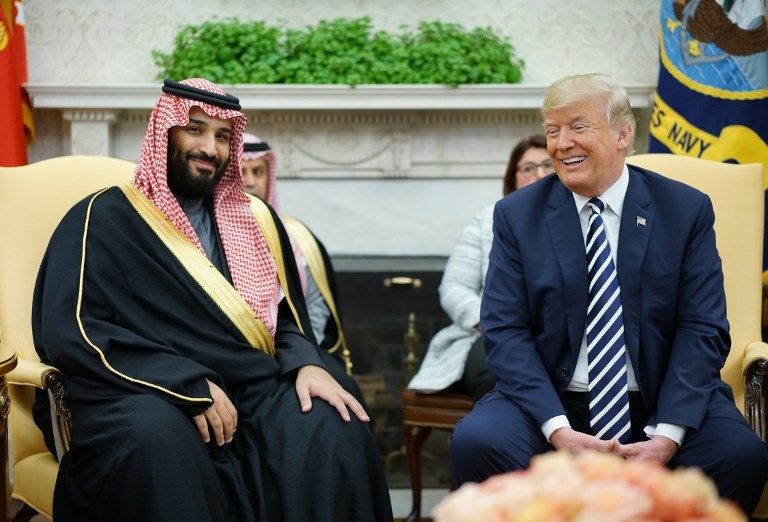
The two-week long visit by Mohammed bin Salman to the US is at risk of being overshadowed by an ongoing legal battle being waged by the families of hundreds of people killed in the 9/11 attacks, two legal sources have told Middle East Eye.
Nearly 3,000 people died when hijacked airplanes crashed into New York's World Trade Centre, the Pentagon building and a Pennsylvania field in September 2001, and lawyers for the families of the victims are optimistic that the latest phase of their long-running legal battle will coincide with the visit of the powerful Saudi crown prince to the US.
The lawyers launched a string of compensation claims against Saudi Arabia in 2016, alleging Riyadh channelled money through charities to al-Qaeda to support the attacks.
They expect the ongoing court battle to move forward in the next few weeks, refocusing attention on the 9/11 families' search for justice as the US relationship with Saudi Arabia is in the media spotlight.
Saudi Arabia also stands accused of supporting the attack through its alleged funding of al-Qaeda training camps and its support for the group, including weapons, funding and logistical support.
The cases seek to take advantage of "Jasta", a 2016 law which provides an exemption to the legal principle of sovereign immunity so families can take the Saudi and other governments to court.
The families point to the fact that majority of hijackers were Saudi citizens, and claim that Saudi officials and institutions "aided and abetted" the attackers in the years leading up to the 9/11 attacks, court documents say.
The judge will rule soon, and we are very, very, very confident we will preveail
- Jim Kreindler, lawyer for 9/11 families
Earlier this year, lawyers for the families also presented sworn statements from two former FBI officials and Bob Graham, the former chairman of the powerful Senate select committee on intelligence, in which they link Saudi officials to two of the 9/11 hijackers.
Now though, two legal sources told MEE that the timing of the legal battle threatens to clash with bin Salman's visit this week to the US.
Saudi Arabia asked a US judge to throw out Jasta cases in January, arguing the victims hadn't provided enough evidence. "Conclusions, speculation, hearsay are not enough," Michael Kellogg, a lawyer for Saudi Arabia told the Manhattan District Court.
Looming legal ruling
However, Jim Kreindler, a lawyer for about 850 victims' families in the case against the Saudi government, told MEE: "The judge will rule soon and we are very, very, very confident we will prevail, the motion will be denied and our litigation against Saudi Arabia will move forward."
Kreindler added the families of 9/11 victims were watching bin Salman's visit to Washington carefully and were "aware of the many US-Saudi issues at play", including the possible listing of Saudi state oil giant Aramco on the New York Stock Exchange, a possible nuclear deal and further arms sales.
"It remains to be seen whether he is going to take a step in accepting Saudi accountability for 9/11," he added.
A second lawyer close to the ongoing legal battle, who declined to be named citing additional pending court action, told MEE: "Justice has been delayed by 16 years, but the judge's decision could come very soon. It would be fitting and appropriate if it came this week or next week."
The source added: "If bin Salman really is a reformist then actions speak far louder than words. Let's see what he does and whether he will really work to counter terrorism from Saudi Arabia."
Bin Salman, who held a meeting with Donald Trump at the White House on Tuesday where he was welcomed with a photograph of tanks and helicopters the US has sold to the kingdom, will travel to New York as part of a two-week visit, but it is unclear whether he will visit the site of the World Trade Centre.
Any developments in the case during the visit would prove acutely embarrassing for bin Salman, who is using the trip to re-brand his conservative kingdom and gain support for his Vision 2030 agenda, a programme of economic and social reforms designed to look to a future without oil revenues.
Saudi Arabia denies any role in the 9/11 attacks in court has pointed to CIA documents from 2005 which said there is no evidence Riyadh supported the attacks.
However, other reports have made numerous links between Saudi Arabia and the attackers and say several of the hijackers had met Saudi nationals with government ties.
Meanwhile a trove of declassified documents, originating from a congressional inquiry into the attacks, suggest evidence of collusion between the attackers and Saudi Arabia.
But, Bin Salman, who was 12 at the time of 9/11, has promised to move Saudi Arabia towards a "moderate, open" form of Islam and to defeat extremism.
'A schism between Riyadh and Washington'
In an interview with a US broadcaster last week, he suggested Osama bin Laden had recruited Saudi hijackers to drive a wedge between Washington and Riyadh. He said: "Osama bin Laden recruited 15 Saudis in the 9/11 attacks with a clear objective.
"According to the CIA documents and Congressional investigations, Osama bin Laden wanted to create a schism between the Middle East and the West, between Saudi Arabia and the United States of America."
However, Terry Strada, who lost her husband Tom in the attack on New York, told MEE that Saudi claims it was countering extremism "ring hollow" and demanded that bin Salman "takes responsibility" for the 9/11 attacks.
"We are not inviting him with open arms, far from it. For me to believe what he is saying, he would have to stop fighting us in the courtroom and own up to how the Kingdom of Saudi Arabia financed and supported the murder of 3,000 people."
Strada, who is national chairwoman of the group 9/11 Families and Survivors United for Justice Against Terrorism, added: "The Saudis are masters of deception, masters of saying one thing and doing another.
"For us to believe bin Salman, he needs to do more than just acknowledge Saudi has a problem with extremism, he needs to take action."
Strada said she remained "positive" that Trump would call on bin Salman to halt Saudi lobbying efforts to overturn Jasta and defeat families in the courts.
'They're not looking at it, very sad'
However, the US president has not repeated his strident campaign-trail support for the 9/11 families since taking office in January last year, and the US leader has said that he is personally trying to convince the kingdom to list the first offering of shares in Aramco in New York.
"It will be perhaps the biggest going-public ever," Trump said in November. "Right now they're not looking at it, because of litigation, risk and other risk, which is very sad."
One risk for Riyadh in listing Aramco in the US is that Jasta allows for the seizure of Saudi assets in the US, and any successful case by the families of 9/11 victims could see a judge freeze Aramco assets to pay for any fine or penalties.
"That means Saudi Arabia would be extremely vulnerable for listings on the New York Stock Exchange," Bruce Riedel, a former CIA, Pentagon, and National Security Council staffer, told the New Yorker last month. "And they know that."
Ironically, Trump was a strong supporter of Jasta and the 9/11 families during his election campaign.
"Obama's veto of the Justice Against Sponsors of Terrorism Act is shameful and will go down as one of the low points of his presidency," Trump said, during the battle for the White House.
In fact, in February 2016 then candidate Trump went as far to accuse Saudi Arabia of being responsible for the 9/11 attacks. “Who blew up the World Trade Center?” Trump said in an appearance on Fox and Friends.“It wasn’t the Iraqis, it was Saudi — take a look at Saudi Arabia, open the documents.”
However, since Trump took office Saudi Arabia has spent at least $250,000 at Trump's new hotel in Washington, the Wall Street Journal reported last summer.
The kingdom's lobbying efforts against Jasta also included bringing military veterans to Congress to speak against the legislation, and to seek to water it down.
Nuclear legislation
US lawmakers introduced a bill on Wednesday to ensure that countries striking deals with Washington on sharing nuclear power technology abandon fuel-making activities that could be altered to make material for nuclear weapons.
The bill would reform current US nuclear energy law to force countries in nuclear partnerships to renounce the pursuit of enrichment and preprocessing technologies and capabilities. The bill also requires a stronger approval process by Congress of civilian nuclear deals.
Saudi Arabia has previously refused to sign any agreement with Washington that would deprive it of the possibility of one day enriching uranium.
Although the bill faces an uncertain future, it sends a message to both Saudi Arabia and the Trump administration that Congress could take steps against any deal that lacks the safeguards, which are known as "gold standard" of any agreement.
Some lawmakers are concerned that if Saudi Arabia and other countries are allowed to enrich uranium that it could one day lead to a nuclear weapons race in the Middle East.
"Congress must ensure that U.S. national security interests are not trumped by political concerns," said Brad Sherman, a Democrat who introduced the bill.
The White House did not respond to a request for comment on the bill.
Saudi Arabia said it needs nuclear power to move away from burning crude oil to generate electricity and to diversify its economy. Earlier this month its cabinet approved a national policy program that limits all nuclear activities to peaceful purposes.
Still, Saudi Arabia's Crown Prince Mohammed bin Salman, told CBS in an interview on Sunday ahead of a trip to Washington that the kingdom will develop nuclear weapons if its arch-rival Iran does so.
Middle East Eye propose une couverture et une analyse indépendantes et incomparables du Moyen-Orient, de l’Afrique du Nord et d’autres régions du monde. Pour en savoir plus sur la reprise de ce contenu et les frais qui s’appliquent, veuillez remplir ce formulaire [en anglais]. Pour en savoir plus sur MEE, cliquez ici [en anglais].


